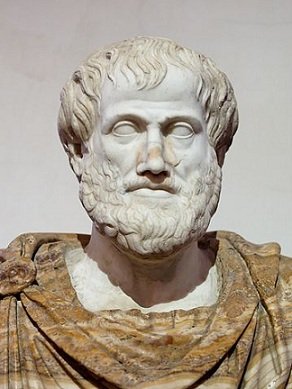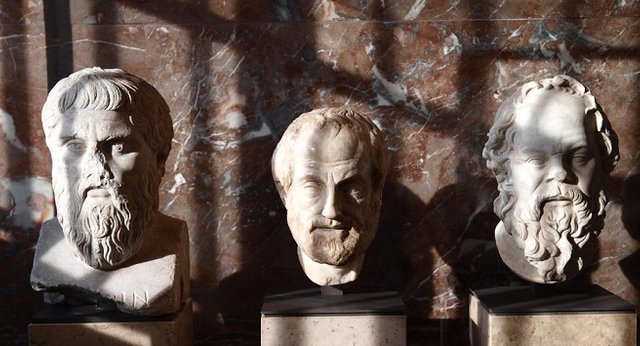ADSactly History : The Contributions Of Egyptian Philosophy To The Wider World - A Survey Of Ancient Greeks [Concluding part]
This is an addendum to the survey of ancient Greece that we started in our first post. We have taken a look at how Egyptian philosophy provided the fulcrum upon which the Greek philosophy hinged on, particularly that which related to the pre-socratic philosophers. We made a review of ancient pre-socratic philosophers and how their interaction with the Egyptian mystery school system propelled them to the row echelon in philosophy. Here, we will focus on Socratic philosophers and their impact to the world of science.
Socratic Philosophers
Remember what I told you about pre-socratic philosophers, they were majorly concerned with the explanation of the "world-stuff"; Socratic philosophers (or rather, the philosophers that were conformed to the Socratic method) were concerned with the ability to stimulate critical and logical thinking to draw inference based on pre-existing assumptions. This is the reason Greek philosophers gained massive influence among the western world that people tend to assume that philosophy originated in Greece. No wonder Greek philosophy is usually called "classical philosophy".
Basically, the Socratic method of philosophy seeks the truth about a particular subject matter by eliminating contradicting hypothesis. Socratic method also incorporates dialog and critical reasoning. Blazing the trial in the Greek philosophy is Socrates who has been considered by philosophy scholars as one of the founding fathers of western philosophy. Here, we will looks at some proponents of Socratic method.

Plato
Plato is a very significant philosopher of the ancient times who lived around 428 BCE to 348 BCE. He had an extensive study in Egypt where he was indoctrinated into the mystery school system of Egypt [ref]. Asides the fact that he was a philosopher, he was also a great mathematician. As a matter of fact, the idea of negative number system is credited to plato and this is a result of the knowledge he acquired while he trained in Egypt. In his school of thought, Plato believed that the answers to "stuff" are gotten by reasoning and not necessarily by experimentation.
After plato's extensive studies in the mystery school of Egypt, he relocated to Athens; Greece, where he opened his own academy which produced first class philosophers and scientists. Among the products of Platos's school is the renowned astronomer and philosopher, Heraclides, who postulated the rotation of the earth round its axis in a 24 hour period. He also talked about the trajectory of planets Mercury and Venus. Let's take a look at another renowned philosopher that rose from Plato's school; Aristotle.
Aristotle
Aristotle was a student of Plato and a very successful one at that. Aristotle moved a little further from his master's school of thought and believed that observation and reasoning were "key" to finding solution to questions - no wonder he became a very respected name among philosophy scholars. Aristotle's works were based on various fields of life including anatomy, astronomy, psychology, metaphysics (philosophy), physics, mathematics, astrology, biology, logic, botany, politics, economics and even law.
Aristotle's contribution and influence to the growth and development of various scientific disciplines were numerous. Even though history has remained somewhat silent whether Aristotle studied in Egypt or not, we know he was tutored by someone that gained extensive knowledge in Egypt. So by inference, he was taught with the same Egyptian syllabus. This means that the ancient Egyptian philosophy had an impact and influence on him.

Socrates
Socrates was one of the most accomplished philosophers of the ancient Greece and the wider world, and was also the teacher of many strategic philosophers like Plato. He lived between 470 BCE and 399 BCE and was recognized as one of the founding fathers of western philosophy with his "Socratic method" of classical philosophy. Even though history was not particular if he studied in Egypt, but some of his methods hinged on what the ancient Egyptian philosophy represents.
Apart from the fact that Socrates was a philosophy scholar, he was also a warrior [ref]. I know many are not aware of this fact, but Socrates fought many battles and even the historic Peloponnesian war at Athens. He was drafted into the "hoplite" (foot soldier) and was very useful under the command of the Athenian general; Alcibiades; because of his courage. Even while at battle, Socrates had a very strong belief that philosophy is a potent tool to achieve a greater good of the society. He went further to propose that the human mind is borne out of the desire for ultimate wisdom, but according to him "this ultimate wisdom comes from the knowledge of one's self".

The socratic method was basically a system of reasoning that majorly hinged on logical argument. In his approach, he would ask questions to the audience and allow them to think out the logical solution themselves. Though many loved this philosophical approach to life, so many others felt vexed by it and this contributed to Socrates' trail before the Athenian law. The trial didn't favour him and he was sentenced to death by the jury; not willing to be exiled, he chose to die with honour.
Shortly before Socrates' death, he pointed out that his death was only a freedom of his soul from his mortal body - no wonder his Socratic methods lived posthumously as evidenced in Plato's Phaedo dialogue. With all these pointers, you will agree with me that western philosophy may not have been possible without the influence of Egyptian philosophy.
Authored by @samminator
Click on the coin to join our Discord Chat

Witness proposal is here:
Go To Steem Witness Page
In the bottom of the page type: adsactly-witness and press vote.

Use small letters and no "@" sign. Or, click here to vote directly!
Thank you!
Without a doubt, the influence of the thought of these philosophers even today is studied in many universities. The Socratic method continues to have logic and effectiveness, based on the principle that we all know something about everything, the idea is to discover and express it. Good topic.
Sure, the Socratic method has remained effective even till this present time.
Thanks for reading
Your synthesis of the Greek philosophers you call Socratic is pretty good. I was surprised you didn't start with Socrates. His method of teaching is known as "mayeutica", which consisted of formulating questions through questions. Almost all of Plato's work is nothing more than the putting into action of the wisdom inherited from Socrates.
Apparently many of his formulations were influenced by Egyptian wisdom, as you maintain.
It would be interesting to look at other products of Egyptian culture, such as The Book of the Dead or Hermes Trismegistus.
Thank you for your post. Greetings, @samminator.
Thanks for the nice comment buddy.
Yeah, Plato is one of the most successful students of Socrates and that was why I chose to start with him, lol.
Ancient Egyptian civilization has inspired European nation's admiration, especially philosophers who are considered the reference in the world philosopher's civilization. We know that Plato, Socrates and Aristotle were philosophers who were considered native of Greece. They have crossed the Mediterranean sea to learn knowledge from Egyptian scientists and philosophers.
From various Egyptian inscriptions, we see a picture of a boat which we interpret interpreters of the essay as familiar with navigation. They walked along the nil river and controlled the vast ocean. Egypt's glory has been heard throughout the world, including Greece.
So it is not surprising that the Greeks studied Egypt and returned to Greece to become the first philosophers in Greece.
Thank you @samminator
Thank you @adsactly
Thank you Steemit
This first line of your comment summarizes the whole post. Thanks for the comment buddy
@samminator, In my opinion world is transformed due to both Reasoning and Experimentation because without an Experiment (Action) there is no movement of change.
But Reasoning hold the upper hand because critical thinking and open mind towards all the Subjects and Beliefs helps anyone to transform and it adds so much flexibility of thoughts inturn it helps in the process of Experimentation.
And Ancient people were more mysterious than anything else. Stay blessed.
Posted using Partiko Android
Nice words @chireerocks. Stay blessed too
Thank you so much brother.
Posted using Partiko Android
Very bold your final statement "Western philosophy may not have been possible without the influence of Egyptian philosophy", however with the arguments you put forward is completely true. Your article is very interesting and I perceive an extraordinary summary capacity. The Egyptians have greatly influenced very aspects of Western culture, in many areas of knowledge. The point is that they did not do it directly but through the dissemination of their contribution in the Greeks, for example. Fascinating this post @samminator. I congratulate you for the space you open for reflection. Cordial greetings @adsactly
Thanks for the kind words @marcybetancourt. Yeah, many ancient western disciplines hinged on Egyptian philosophy. This is one of the reasons Africa has been said to be the birthplace of civilization.
Thanks for reading
I congratulate your ability to synthesize. You managed to summarize years of stories and to do it in a clear way. This series was very interesting to me, especially because in today's world, young people don't give importance to the past and are not curious to find the root of things, nor do they know about history. The love of knowledge, the curiosity of man, is precisely the principle of science and philosophy. He who knows where he comes from may know where he is going. Greetings, @samminator
Thanks a lot Nancy.
This is absolute truism and words of wisdom. This is part of the reasons I've given much importance to history.
Thanks for coming around